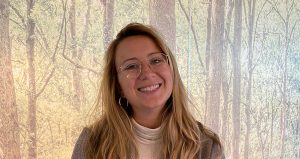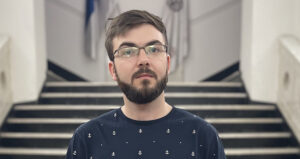Nina: “Analyzing pollutants with cutting-edge spectroscopy equipment”

-
 Editorial Team
Editorial Team
Share article:
Nina Nicoleta Lazar from Romania participates in the European Junior Water Programme (EJWP). She is a research assistant in the spectrometry laboratory at the Jos University of Galați in Romania. “My research focuses on the qualitative and quantitative analysis of pollutants affecting our aquatic ecosystems, utilizing cutting-edge spectroscopy equipment,” explains Lazar.
What is your current work position?
“I am a research assistant P.hD. engineer in the spectrometry laboratory at REXDAN Research Infrastructure within Dunarea de Jos University of Galati in Romania.”
Can you describe one of your work days?
“Working in the field of research is as beautiful as it is challenging and intense. A typical day at work for me starts at 8:30 AM when I arrive at the REXDAN Research Center. Usually, I take a few good minutes to plan my work for the day alongside the laboratory supervisor and/or the scientific director. Afterwards, the actual work in the laboratory begins. First, I perform the preliminary preparation of samples followed by the qualitative and quantitative analysis of the target compounds utilizing the latest generation equipment within the spectroscopy laboratory. At the end of the analyses, I collect the results and statistically process them so that I can report them further. And because in research you know when you start, but you don’t know when you finish, I consider myself lucky when I manage to complete all activities around 4:30 PM.”
What do you consider the most interesting part of your job?
“From my perspective, the job I have allows me to constantly learn something new, it challenges me, it provides me with the opportunity to grow as both an individual and a researcher, and it helps me to meet new people.”
What is a topic that you see as increasingly important in the water sector?
“I consider that the most important subject in the water sector is and will remain pollution because it affects the entire aquatic ecosystem, as well as other ecosystems, including humans. This topic is also studied within the REXDAN Research Infrastructure through the projects we conduct.”
What do you expect from international cooperation?
“I expect international cooperation to facilitate the exchange of soft skills such as communication, teamwork, and cross-cultural understanding among professionals in the water sector. By collaborating with experts from different countries, I anticipate gaining diverse perspectives, enhancing my interpersonal abilities, and collectively finding innovative solutions to complex water-related challenges. Moreover, I look forward to building strong networks and fostering mutual respect and collaboration across borders for the sustainable management of water resources.”
Why are you joining EJWP?
“EJWP offers a unique opportunity to engage with a diverse group of professionals from across Europe, exchanging knowledge, experiences, and best practices. By participating in EJWP, I aim to broaden my understanding of water management issues, enhance my professional skills, and contribute to innovative solutions that promote sustainability and resilience in the water sector. I am excited to be part of a dynamic network that fosters personal growth, fosters collaboration, and drives positive change in the water industry.”
What and where did you study?
“I have completed my studies (bachelor, master, and doctoral) in the field of Food Engineering, all within Dunarea de Jos University in Galati, Romania.”

















